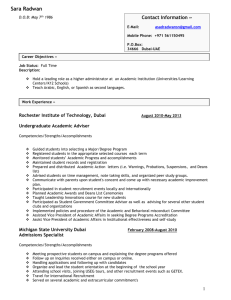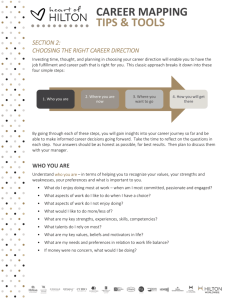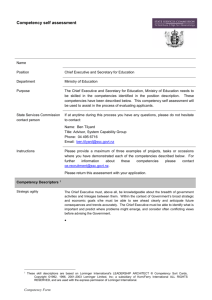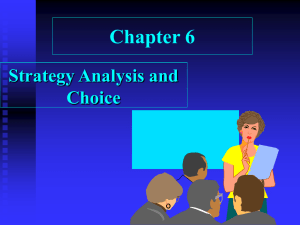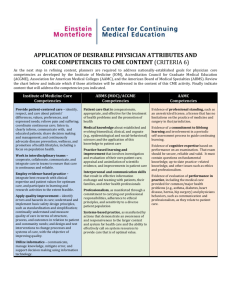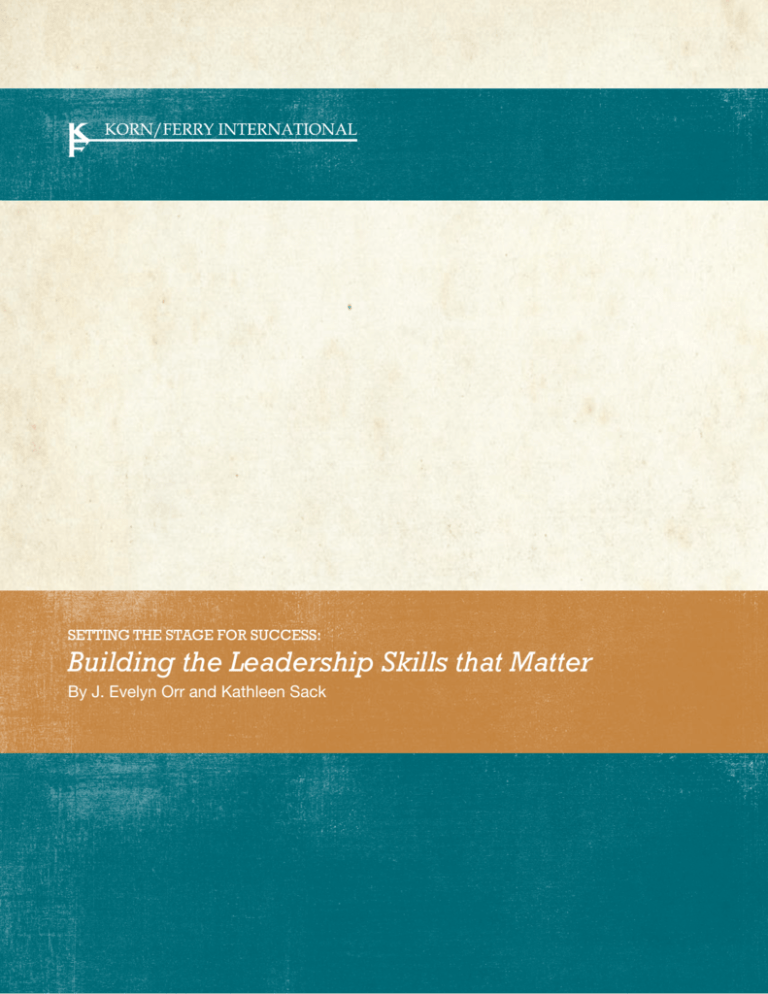
Setting the Stage for Success:
Building the Leadership Skills that Matter
By J. Evelyn Orr and Kathleen Sack
How will you focus your
organization’s leadership
development efforts in the areas that
matter most?
The current economic environment has ushered in new expectations for
leaders – from increased scope of responsibility to heavier workloads to
making decisions in more ambiguous conditions. Have these different
expectations affected the set of skills that make a great leader? In this paper
we will explore whether certain leadership competencies are increasing or
decreasing in importance and skill level in the current economic climate. In
addition, based on our analysis of the data, we will provide a perspective on
the leadership skills that could matter most for leadership development in the
coming year.
The recent turbulence in the marketplace has shaken things up in many
organizations. It’s worth paying attention to the noticeable shifts that have
occurred. Leaders who were previously successful with their approach may
be finding that they need to alter how they lead to get results in this new
environment. In general, leadership skills that always have been important are
still important today. However, our research suggests that some leadership
skills are emerging as even more important. With limited time and resources,
how will you focus your organization’s leadership development efforts in the
areas that matter most?
Our research suggests that some
leadership skills are emerging as
even more important.
A snapshot in time
If we were to take a snapshot of leadership during this uniquely challenging
economic climate, what would we see? The 2009 Leadership Architect®
Global Normative Study focuses on data collected over a one year period,
from April 2008 through May 2009 (Dai, Tang, and De Meuse, 2009). During
this time period, 7,575 leaders across regions, industries, job functions and
levels were rated on skill for the 67 Leadership Architect® competencies in
the VOICES® 360° multi-rater survey. For 6,155 of those leaders, raters also
assessed how important the leadership competencies are for success in their
job.
Overall, leaders’ skill levels have remained fairly stable when we compare the
rank order in this study to past normative studies from 2006 (r=0.97) and
2003 (r= 0.94). Importance ratings are also fairly stable when compared with
2006 (r=0.98) and 2003 (r= 0.94).
However, several key themes emerge when we take a closer look at how
leadership competencies have shifted in rank order – both in terms of skill
level and perceived importance. Noting the competencies that show an
increase or decrease in rank order compared to the 2003 normative study
gives us a sense of the changing landscape. Specifically, we can see which
2
competencies raters perceive to be even more important today. But that does
not provide us with the total picture.
Eichinger and Lombardo (2002) state that raters accurately predict the
competencies critical to success about 60% of the time. The
margin of error needs to be addressed with another set of
Raters accurately predict the
data. Research conducted at Lominger has defined a core set
competencies critical to success
of leadership competencies that correlate with performance
about 60% of the time.
and potential. Furthermore, the competencies most related to
performance and potential vary by level. In other words, what
matters most for an executive is often different from what matters most for
an individual contributor. Combining what we know about the competencies
raters perceive to be important as well as the competencies our research links
to performance and potential provides us with a more complete analysis of
what leadership skills matter most. Before we dive into the specifics for the
executive, manager, and individual contributors levels, let us first review our
findings at a high level.
The data reveal that some leadership skills are increasing in
importance and leaders’ skill level is keeping in step. Leaders are proving
themselves to be master problem solvers during these tough times. They seem
to be willing to encounter and learn from challenges and high stakes situations.
And they appear to recognize the importance of bringing others along as they
lead people through tough situations in a determined and courageous way.
Our research indicates that other critical leadership skills are either
undervalued or low in skill. Leaders are lacking a creative spark – the
ability to incubate new ideas that could transform the business landscape.
Creativity and Innovation Management* are being drowned out by the play
it safe, hunker down in a crisis, risk averse mode of operating. Along with
the lack of creativity, there seems to be a lack of inspiration. Leaders are not
helping employees focus on why what they are doing matters. Of course,
employees are appreciative to have a paycheck. But as the job market opens
up, it will take more than benefits and compensation to motivate employees
to stay. In a recent poll, 65% of senior executives were “highly” or “very highly”
concerned that high potentials and leadership will leave once the economy
turns (Billington and Korver Swanson, 2009). How leaders begin to engage
and inspire the organization can head off a potential brain drain.
*Note: Leadership competencies capitalized throughout the paper are from The
Leadership Architect® library of competencies (Lombardo and Eichinger, 2009).
3
Overall, importance ratings show an increased emphasis on the
ability to operate the business and execute work effectively in a
challenging environment. Complex decision making and innovation show
a decrease in importance ratings. Getting the work done by developing
others, carefully tracking progress, and managing resources and processes
efficiently have all increased in importance. However, it’s not just about
execution, there is increased emphasis on leaders’ ability to be courageous
and manage conflict – all while remaining patient, approachable team
builders. Sounds like a tall order.
Focusing Leadership Development Efforts
So, what leadership skills need immediate attention? Let’s take a closer
look at how you can focus leadership development efforts for executives,
managers, and individual contributors.
As discussed earlier, leadership competencies that correlate with
performance and potential may or may not be perceived to
be important - sometimes they are overlooked and undervalued. People may not immediately buy into the value of
Address strengths and weaknesses
these competencies. They are hidden gems. Other leadership
for important leadership skills
competencies are already recognized as highly important. Raters
that may or may not be seen as
have ranked them in the top third. No convincing is required to get
important by the organization.
people on board with the importance of these skills.
Skill level varies for competencies deemed to be important by
research, raters, or both. Competencies rated low in skill are in low supply
in the general population. These are the competencies that will differentiate
an individual and create competitive advantage for an organization. It may
be tempting to rest easy on the leadership competencies that show up in
the top third of skill ratings, however, if importance is increasing, or if skill is
slipping slightly, these areas require some attention.
The table below illustrates how you can address strengths and weaknesses
for important leadership skills that may or may not be seen as important by
the organization.
4
Lower
Skill
Higher
Important Leadership Skills
Untapped Strengths
Leveraged Strengths
Leaders possess these strengths
which correlate with performance
and potential, but many people don’t
perceive these skills to be important.
Raise awareness and leverage
these valuable skills.
Leaders are strong and need to
maintain or improve their competence
in these increasingly important skills.
Build on these strengths.
Hidden Differentiators
Known Differentiators
If we took the time to value and
develop these skills, leaders could
stand out from the crowd and
create competitive advantage for the
organization. Get buy-in and develop
these differentiators.
These skills are increasingly important,
but leaders are low or average in
these areas and need development.
Develop these differentiators.
Important but Undervalued…
Important and Valued…
Important
Building the Leadership Skills that Matter
for Executives
How are executives doing overall? As we would suspect, their skill ratings
are higher than those of managers or individual contributors. That’s good
news for those of us who want to trust and follow the leaders in our
organization. The other good news is that the executive skill set appears
relatively well matched to the job. To judge the degree of alignment
between skills and the job, we looked at low, middle, and high skill ratings
and mapped those to low, middle, and high importance ratings. Over 57%
of the time (38 out of 67 competencies) executives’ level of skill matched
the level of importance. For example, Problem Solving was rated high in
importance and high in skill whereas Personal Disclosure was rated low in
importance and low in skill. What about the other 29 competencies where
the skill level is not perfectly matched to the degree of importance? Let’s
take a closer look at where to focus executive leadership development.
Executive skill ratings are
higher than those of managers
or individual contributors and
executives’ skill set is relatively well
matched to the job.
5
Untapped Strengths
Leveraged Strengths
Learning on the Fly
Dealing with Ambiguity
Decision Quality
Perspective
Problem Solving
Hidden Differentiators
Known Differentiators
Creativity
Innovation Management
Managerial Courage
Managing Vision and Purpose
Motivating Others
Important but Undervalued…
Important and Valued…
Lower
Skill
Higher
Executives: Important Leadership Skills
Important
Leveraged Strengths
The increased importance of Problem Solving and Decision Quality is a
testament to how people are looking to executives for leadership in tough
times. Executives are expected to find solutions, provide decisive direction in
a crisis, and tackle challenges with fervor. Problem Solving skills are strong
and trending up. On the other hand, Decision Quality, while still ranked in the
top third of executives’ skills, has decreased in skill. Complementing decision
making with other skills such as Problem Solving and Perspective can help
leaders avoid poor judgment.
People are looking to executives
to find solutions, provide decisive
direction in a crisis, and tackle
challenges.
Two emerging strengths for leaders that are increasingly important
are Dealing with Ambiguity and Perspective. Taking a broad view
of an issue, projecting it into the future (even though the future
is more uncertain than ever), and taking action without the total
picture is a daily requirement for most executives. These skills
are moderately hard to develop, but with all the practice of late,
executives are showing improvement.
Known Differentiators
As mentioned above, leaders seem to be courageously facing up to
problems. For executives, Managerial Courage is highly important and
moving up in rank order, while skill is average and trending up. Getting
executives to speak up about and deal with things that are not going well will
be critical to getting the business back on track.
6
A very strong theme in the data is the need for executives to inspire
people. If a leader can frame up the mission and vision for the organization,
articulate how people’s activities or skills fit into that picture, and engender
trust and hope in ambiguous times, then employees will be more engaged
and more likely to expend extra effort to achieve the organization’s goals.
Raters have cast their vote and Managing Vision and Purpose is among
the most important skills for executives but remains low in skill. Motivating
Others, already low in skill, has dipped 8 spots in rank order of skill. If there
is one area that leaders need to focus on, this is it. And for organizations
that fear losing talented employees once the recovery begins, the sooner
leaders begin to inspire them, the better.
Untapped Strengths
People see that executives are strong in Learning on the Fly, but they do
not see how it contributes to success. Being open to change, willing to
experiment, and eager to learn from new experiences may be undervalued
but it is correlated with performance and potential. Learning on the Fly is
the difference between being stumped, frustrated, or bailing out versus
being solution-oriented when faced with a seemingly insurmountable
problem.
Hidden differentiators
Creativity and Innovation Management are two skills that we know
correlate with high performance, but these have decreased in both skill
and perceived importance since 2003. In order to be competitive, it’s time
to move out of crisis management and begin to value innovation and the
creative process once again. These skills won’t be luxuries – they will be
critical success factors and possibly a matter of survival for organizations in
the next couple of years.
Building the Leadership Skills that Matter
for Managers
For managers’ leadership competencies, the level of skill aligns with the
level of importance 51% of the time. This suggests that there is some
room for improvement. Managers are transitioning from doing the work
themselves to getting results through others which requires a lot of new
skills. Many of managers’ development opportunities are concentrated in
the themes of Getting Work Done Through Others, Dealing with Trouble,
and Inspiring Others.
For organizations that fear losing
talented employees once the
recovery begins, the sooner leaders
begin to inspire them, the better.
In order to be competitive, it’s time
to move out of crisis management
and begin to value innovation and
the creative process once again.
Many of managers’ development
opportunities are concentrated in
the themes of Getting Work Done
Through Others, Dealing with
Trouble, and Inspiring Others.
7
Untapped Strengths
Leveraged Strengths
Self-Development
Time Management
Action Oriented
Business Acumen*
Ethics and Values
Perseverance
Hidden Differentiators
Known Differentiators
Creativity*
Perspective*
Building Effective Teams
Command Skills*
Conflict Management
Decision Quality*
Developing Direct Reports
and Others
Managing Vision and Purpose*
Motivating Others*
Important but Undervalued…
Important and Valued…
Lower
Skill
Higher
Managers: Important Leadership Skills
Important
* Develop now to prepare for executive level roles.
Managers need to develop the
ability to inspire others for success
in their current role – and it’s even
more important as they move to
the executive level.
8
Leveraged Strengths
Taking initiative, having strong business sense, and an unwillingness to give
up are sought after skills at the manager level. These are among managers’
top skills, and any increase in these skills will help managers continue
to meet and exceed expectations. Action Oriented, Business Acumen,
and Perseverance are ranked higher in importance by 7, 12, and 5 spots
respectively.
Deepening awareness of personal and corporate ethics and values will
enable managers to make decisions and take actions in a consciously
principled manner. It is increasingly important that managers model ethics
and values to reinforce the organization’s standard of conduct. To be
considered talented in this area, managers need to be able to deal with close
calls or paradoxical issues as well as speak up when they notice anything
inconsistent. Ethics and Values rose in rank order of importance by 14 spots
at the manager level.
Known Differentiators
In times of uncertainty and dwindling resources, keeping employees
engaged, motivated, and working together to accomplish business
objectives is increasingly important. Managers have a lot of work to do in
this area. Motivating Others, Managing Vision and Purpose, and Building
Effective Teams are all ranked high in importance but are among the low
end of managers’ skills. Managers need to develop the ability to inspire
others for success in their current role. Moving to the executive level, the
importance of these skills only increases.
Command Skills and Conflict Management have both increased in
importance. Some might say that being able to take the heat, take
unpopular stands, and deal directly with conflicts are innate qualities or
depend on an individual’s personality. But these skills can be developed.
Managers are average and improving in their ability to lead in a crisis,
face adversity and facilitate tough debate. Managers need more practice
managing conflict, however. The ability to address conflict directly and
use it as an opportunity to facilitate productive dialogue and find common
ground is something that can be taught and learned.
Decisions are made today with more ambiguity and higher stakes.
Making quick decisions showed a slight decrease in importance
while skill remained static. Decision Quality, on the other hand,
was rated highly important but decreased in skill (by 11 spots).
Managers who master balancing decision making so that it is both
speedy and sound will have found the golden ticket.
Managers who master balancing
decision making so that it is both
speedy and sound will have found
the golden ticket.
Developing Direct Reports and Others continues to be one of the lowest
ranked skills. It’s not hard to make a case for improving this – managers
who develop people fuel the talent pipeline for the entire organization.
Untapped Strengths
Self-Development correlates with performance and potential at the
manager level though it is not perceived to be important. Being skilled
at Self-Development involves a strong commitment to self-improvement
and active effort toward using strengths and making up for weaknesses.
Managers tend to be average at this, and we know that it is moderately
difficult to develop. However, the simple act of acknowledging the value of
Self-Development can provide managers with more opportunities to put
this critical skill into practice.
9
With resources diminished and
expectations for productivity
increasing – managers will have
to leverage their ability to manage
time and set priorities.
Taking a broad view and drawing
on a variety of topics to pull
together something new and
original would create competitive
advantage.
Time Management is considered important by raters, but both importance
and skill have dropped since 2003. Currently, managers are compensating by
compromising their work/life balance (this skill has decreased in rank order
by 26 spots). With resources diminished and expectations for productivity
increasing – managers will have to leverage their ability to manage their time
and set priorities.
Hidden differentiators
Taking a broad view and drawing on a variety of topics to pull together
something new and original are skills that would provide competitive
advantage to an organization. Both Perspective and Creativity are
undervalued at this level, and managers’ ability to be creative has slipped
by 12 spots in rank order of skill. Understandably, managers have been
heads-down and focused on the short-term tactical picture lately. But it’s
time to look up and look around to spark ideas for the next innovative idea or
product.
Building the Leadership Skills that Matter
for Individual Contributors
Remember, individual contributors
are future leaders of the
organization – start developing
them early in areas that will
continue to be important as they
move up in the organization.
10
Providing some leadership development for individual contributors can be
a critical component to an organization’s learning and development and
succession strategies. Remember, individual contributors are future leaders
of the organization – they just happen to be in the early stages of their career,
or for seasoned professionals, they just happen to not have direct reports at
the moment.
Individual contributors’ skill set is a 45% match to what’s critical for their
role. One encouraging finding is that individual contributors are rated at least
moderate to highly skilled at competencies that are highest in importance.
There’s plenty to work on, however. This is the talent pool of individuals who
will be taking on leadership roles with fewer years of experience than their
predecessors. Start developing them early in areas that will continue to be
important as they move up in the organization.
Untapped Strengths
Leveraged Strengths
Creativity*
Action Oriented*
Drive for Results*
Ethics and Values*
Perseverance*
Process Management*
Hidden Differentiators
Known Differentiators
Sizing Up People
Managing Vision and Purpose*
Business Acumen*
Conflict Management*
Informing
Motivating Others*
Organizing*
Planning
Strategic Agility*
Important but Undervalued…
Important and Valued…
Lower
Skill
Higher
Individual Contributors: Important Leadership Skills
Important
* Develop now to prepare for manager and executive level roles.
Leveraged Strengths
Individual contributors make a strong showing in the area of Energy and
Drive. They don’t hesitate to take action, they persevere when it would be
easier to give up, and they are focused on getting results. On top of it all,
they’re doing a great job of Process Management (which increased in both
importance and skill) by efficiently coordinating resources and work flow.
Individual contributors are expected to be very skilled in Ethics and Values,
which rose 20 spots in rank order of importance. Similar to managers, they
need to clarify and be conscious of their personal values as well as the values
of the organization. The ability to state the values and standards they hold
will enable them to apply them and speak up in situations that need careful
ethical consideration.
Overall, individual contributors
don’t hesitate to take action, they
persevere when it would be easier
to give up, and they are focused on
getting results.
Known Differentiators
Where do individual contributors need to focus their development? Some
areas will reap immediate benefits and other areas will benefit them later
11
For immediate impact, individuals
should focus on thinking ahead,
and scoping effort / resource
requirements to accomplish
specific objectives.
in their career. For immediate impact, individuals should focus on thinking
ahead, scoping effort and resource requirements to accomplish specific
objectives, and providing the right information at the right time to people
who need to know. Planning and Strategic Agility are important, but skill
level is sliding and needs to be shored up. Informing has jumped up 16
spots in importance since 2003 which could be related to the fast-paced but
ambiguous environment in which we are all operating.
Motivating Others or influencing without authority is important for
individual contributors and continues to be important at higher levels in the
organization. And yet, all levels are weak in this area. So, perhaps focusing
on the development of this differentiating competency early will change the
result later on when this group takes on manager and executive roles.
Individual contributors need to be
even better at multi-tasking, finding
scarce resources and reducing
waste and re-work.
Organizing is trending up in skill, but the level of skill doesn’t quite match the
degree of importance for this competency. Doing more with less has become
a way of life. Organizing is correlated with high performance at all levels, so it
makes sense for individual contributors to improve their ability to multi-task,
find scarce resources and reduce waste and re-work.
Other skills that increase in importance over the course of an individual’s
upwardly mobile career include:
• Business Acumen (increasing in importance but trending down in skill
and correlated with performance at the executive level)
• Conflict Management (increasing in importance and correlated with
performance at the manager level)
Addressing these with development plans now will ensure that individuals
seek out and learn from the experiences that test and build the skills that
contribute to future success.
Untapped Strengths
For individual contributors, Creativity is again under-valued as it is at the
executive and manager levels. In fact, Creativity has dropped 32 places in
rank order of importance. Knowing that it correlates with performance and
potential across all levels creates a compelling case to build awareness and
appreciation for this skill in the organization and find ways to encourage the
generation of new ideas.
Hidden differentiators
Sizing Up People correlates with performance and potential at this level,
12
but individual contributors are not skilled at observing people’s strengths
and weaknesses or predicting how people will perform in various situations.
Noticing people’s particular styles and talents can help individuals navigate
the differences in order to get the best results. Moving the needle on this skill
will help individual contributors leverage colleagues’ diverse talents to get
valuable work done.
Another differentiator to focus on developing is Managing Vision and Purpose.
We’re not suggesting that individual contributors create the vision, rather that
they thoroughly understand the vision, embrace it, and link their work to the
broader purpose. Strong ability in this area will enable individual contributors
to ask the right questions, think critically about their deliverables, and offer
better ways to achieve the results the organization is after.
Individuals who link their work to
the broader organizational purpose
can offer better ways to achieve the
results the organization is after.
What you can do
In a recent poll, talent management professionals were asked which
trends they see as the greatest challenge to their talent acquisition efforts
(Hallenbeck and Connell, 2009). The top three responses were:
#1 Internal resources will continue to be stretched thin.
#2 Keeping the talent we need will be a challenge.
#3 The requirements for success have changed.
These challenges apply not only to acquiring and placing the right talent but
also to developing talent. How can you adjust your leadership development
approach in light of these challenges? We’ve identified seven key approaches
to consider as you implement your leadership development strategy.
Clearly state the company’s expectations
Take the time to articulate what is necessary for success and what is valued.
Providing leaders with the language to describe the target skill set will help
them reflect on what they’re doing well and where they’re falling short. Making
the target visible will help shape the company culture, give people a way to
seek feedback, and set them up for success. If you already have success
profiles or competency models in place, review and refresh them to reflect the
current reality of what makes people successful.
How can you adjust your
leadership development approach
in light of the current challenges?
Articulate what is necessary
for success – it will help shape
the company culture and
people’s behavior.
Focus your development investment
Budgets require us to look for alternatives to the traditional approach to
training and development. With time and money in scarce supply, re-evaluate
the dollars and hours spent on classroom training for specific skills. Consider
13
Create development initiatives
that become a natural part of
employees’ work day.
providing some structure and support around development initiatives
that become a natural part of employees’ work day. This could include
development conversations with managers, mentor assignments, action
learning opportunities, or thoughtfully matching employees to projects and
explaining why. Whichever approach you pursue, ensure that developing
talent is not eclipsed by the organization’s focus on surviving the downturn.
Keep development relevant
No one has time for anything that isn’t going to help them do their job better
or faster today. Make sure that you provide skill building opportunities that
are just-in-time for on-the-job application.
Tailor development to the individual
Let the individual seek out what they need when they need it. This is a pull
model. What’s available if someone calls up with a need? Will you have a
resource to point them to? How will you position yourself as an invaluable
business partner who can support their development?
The current economic climate
provides a work environment rich
with development potential.
Optimum learning happens when
the challenge is just beyond the
grasp of the learner… not when it’s
a sink or swim assignment.
Frame work as development
Research strongly suggests that 70% of development comes from
experiences where there is something at stake, where success matters.
Leaders are facing challenges today that are likely taking them out of their
comfort zone. The current economic climate provides a work environment
rich with development potential. Help people see that and what’s in it for
them.
Watch out for overload
Challenging experiences and assignments are developmental, but when do
they reach the point of diminishing returns? If leaders sense that support and
empathy are non-existent, the burn out factor becomes very real. Optimum
learning happens when the challenge is just beyond the grasp of the
learner… not when it’s a sink or swim assignment that is 10 steps beyond
the person’s capability.
Be proactive
Business cycles are well documented. We know that there will be boom and
bust, so don’t get caught off-guard. Build your organization’s resiliency by
developing leaders who can handle different economic environments. It may
be tempting to call upon seasoned leaders who have successfully navigated
through a similar crisis, but consider strategically placing high potentials in
high stakes situations. Providing real development opportunities will build
your organization’s bench strength and help ensure long-term success.
14
The bad news / good news story is that the very experiences that make
work stressful (high risk, high stakes, the possibility of failure) are the same
experiences that develop leadership skills. Carefully frame high stakes
assignments as opportunities for employees to develop their leadership skills.
Provide a place where leaders can try things out, learn, watch reactions
and interactions, develop theories and test them. This approach
will build the skills and confidence to prepare them for the next
level of leadership. Albert Einstein said, “I never teach my pupils.
I only attempt to provide the conditions in which they can learn.”
By leveraging the challenges you’re facing in the recession and
recovery, you can create the conditions that will build the leadership
skills that matter most for the future.
I never teach my pupils.
I only attempt to provide
the conditions in which
they can learn.
– Albert Einstein
References
Billington, M., & Korver-Swanson, L. (2009, September) Superleaders return!
Developing leaders who save the day, quarter, and fiscal year.
Presentation conducted at the Chief Learning Officer Fall Symposium,
Colorado Springs, CO.
Dai, G., Tang, K. Y., & De Meuse, K. P. (2009). The Leadership Architect® 2009
global norms report I: Competency norms and analysis technical
report [White paper]. Minneapolis: Lominger International: A Korn/Ferry
Company.
Hallenbeck, G., & Connell, S. (2009). Preparing for the recovery: How to hire
the right talent [White paper]. Minneapolis: Lominger International: A
Korn/Ferry Company.
Lombardo, M. M., & Eichinger, R. W. (2002). The leadership machine:
Architecture to develop leaders for any future (3rd ed.). Minneapolis:
Lominger International: A Korn/Ferry Company.
Lombardo, M. M., & Eichinger, R. W. (2009). For your improvement: A guide
for development and coaching (5th ed.). Minneapolis: Lominger
International: A Korn/Ferry Company.
15
J. Evelyn Orr, M.A. is an Intellectual Property Development
Consultant with Korn/Ferry Leadership and Talent Consulting.
Kathleen Sack, M.A. is a Principal with Korn/Ferry
Leadership and Talent Consulting.
About Korn/Ferry International
Korn/Ferry International (NYSE: KFY ), with more than 90 offices in 40
countries, is a premier global provider of talent management solutions. Based
in Los Angeles , the firm delivers an array of solutions that help clients to
identify, deploy, develop, retain and reward their talent.
About Lominger
Founded in 1991 by Robert W. Eichinger, Ph.D. and Michael M. Lombardo,
Ed.D., Lominger produces a suite of competency-based leadership
development resources for individuals, teams, and organizations. In August
2006, Lominger joined the Korn/Ferry International family of companies.
For more information on the Korn/Ferry International family of companies,
visit www.kornferry.com.
Copyright © 2009, Korn/Ferry International. All rights reserved.
16



